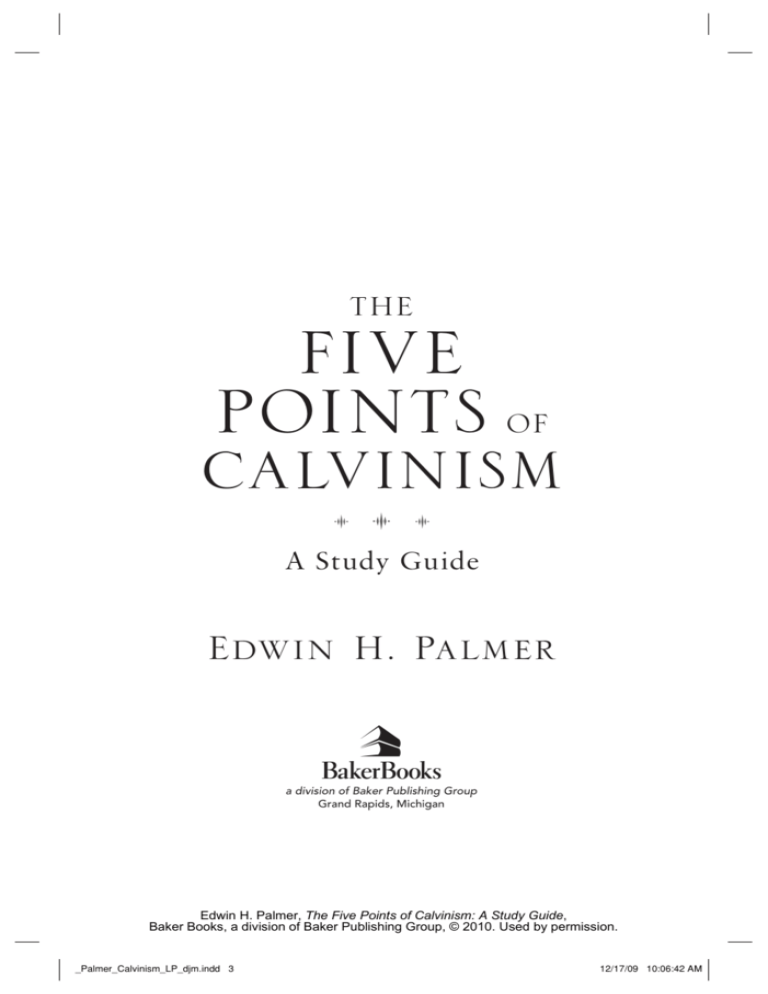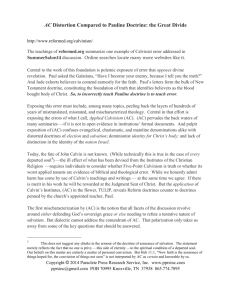
The
Five
Points of
Calvinism
∑ ∑ ∑
A Study Guide
Edwin H. Palmer
C
Edwin H. Palmer, The Five Points of Calvinism: A Study Guide,
Baker Books, a division of Baker Publishing Group, © 2010. Used by permission.
_Palmer_Calvinism_LP_djm.indd 3
12/17/09 10:06:42 AM
© 1972 by Baker Books
Published by Baker Books
a division of Baker Publishing Group
P.O. Box 6287, Grand Rapids, MI 49516-6287
www.bakerbooks.com
New paperback edition published 2010
ISBN 978-0-8010-7244-4
Previously published in 1980
Printed in the United States of America
All rights reserved. No part of this publication may be reproduced, stored in a retrieval
system, or transmitted in any form or by any means—for example, electronic, photocopy,
recording—without the prior written permission of the publisher. The only exception
is brief quotations in printed reviews.
Library of Congress Cataloging-in-Publication Data
Palmer, Edwin H.
The five points of Calvinism : a study guide / Edwin H. Palmer. — New pbk.
ed.
p. cm.
Includes bibliographical references.
ISBN 978-0-8010-7244-4 (pbk.)
1. Calvinism—Textbooks. I. Title.
BX9422.3.P35 2010
230 .42—dc22
2009045597
10 11 12 13 14 15 16 7 6 5 4 3 2 1
Edwin H. Palmer, The Five Points of Calvinism: A Study Guide,
Baker Books, a division of Baker Publishing Group, © 2010. Used by permission.
_Palmer_Calvinism_LP_djm.indd 4
12/16/09 1:55:38 PM
Contents
Foreword 7
Preface 9
1. Total Depravity 11
2. Unconditional Election 29
3. Limited Atonement 49
4. Irresistible Grace 67
5. Perseverance of the Saints 81
6. The Great Mystery 99
7. Twelve Theses on Reprobation 117
8. Resource Materials 147
Calvin’s Attitude toward Predestination 147
The Belgic Confession of Faith (1561) 150
The Westminster Confession of Faith (1648) 154
The Heidelberg Catechism (1563) 164
Notes 167
Bibliography 171
5
Edwin H. Palmer, The Five Points of Calvinism: A Study Guide,
Baker Books, a division of Baker Publishing Group, © 2010. Used by permission.
_Palmer_Calvinism_LP_djm.indd 5
12/16/09 1:55:38 PM
Foreword
I
n 2009, Time magazine listed “The New Calvinism” among
the top ten movements changing the world today. Across the
denominational landscape, there is an obvious trend among
younger Christians toward doctrines that many historians
regarded as no longer viable in a democratic, individualistic,
and “pull-yourselves-up-by-your-own bootstraps” kind of
society.
What is the attraction? According to many testimonies, it
is a grand view of God and his saving grace in Jesus Christ.
These Christians often relate that they were reared in a spiritual environment aptly characterized by the title of J. B.
Phillips’ little book, Your God Is Too Small. They are overwhelmed with the God-centered orientation of the Scriptures,
which challenges the human-centered preoccupations that
seem to characterize much of popular worship, preaching,
and evangelism.
Whatever impressive gains that we can see today for the
doctrines of grace—otherwise known as “the five points of
Calvinism”—are the fruit of patient sowing of seeds by faithful pastors who never lived to see the full flowering of their
7
Edwin H. Palmer, The Five Points of Calvinism: A Study Guide,
Baker Books, a division of Baker Publishing Group, © 2010. Used by permission.
_Palmer_Calvinism_LP_djm.indd 7
12/16/09 1:55:38 PM
Foreword
labors. Surely Edwin Palmer deserves a place at the top of
that list, for the introduction that you hold in your hands.
I read this book as a teenager who, like many today, was
searching for a fuller understanding of Christian faith and
practice that is found in Scripture. It was one of those books
that was always recommended by the likes of James Boice,
J. I. Packer, and R. C. Sproul. Today, there are many introductions to these truths, but Palmer’s remains unsurpassed for its
clarity, brevity, and the simplicity of its exegetical insight. He
does not engage in caricatures of rival views, but concentrates
on the biblical arguments and pastoral implications.
The great church father Augustine tells the story of his
conversion through hearing a boy next door singing, “Take
up and read.” Lying on Augustine’s table was Paul’s Epistle to
the Romans and he took this as an invitation to read through
the apostle’s famous letter. The rest is history. Short of picking up Romans itself, I can think of no better place to begin
than this classic exploration of God’s sovereign grace in the
salvation of sinners.
Michael Horton
Westminster Seminary California
8
Edwin H. Palmer, The Five Points of Calvinism: A Study Guide,
Baker Books, a division of Baker Publishing Group, © 2010. Used by permission.
_Palmer_Calvinism_LP_djm.indd 8
12/16/09 1:55:39 PM
Preface
T
he title The Five Points of Calvinism can be misleading.
For Calvinism does not have five points; and, neither is
Calvin the author of the five points.
First of all, Calvinism is not restricted to five points; it has
thousands of points. The first word that Calvinism suggests
to most people is predestination; and if they have a modicum
of theological knowledge, the other four points follow. But
this is wrong. Calvinism is much broader than five points. It
is not even primarily concerned with the five points. In the
first catechism which Calvin drew up (1537), predestination
is only briefly mentioned. In the Confession of Faith, drawn
up in the same year, there is no mention of it at all. In another catechism and four confessions attributed to Calvin,
the doctrine is mentioned only in passing. And in the first
edition of his monumental work, The Institutes, it is given no
important place even when he treats the matter of salvation.
It was only in later editions, after attacks had been made on
the grace of God, that he enlarged upon predestination.
Calvinism has an unlimited number of points: it is as broad
as the Bible. Does the Bible teach about the Trinity? Then
Calvinism does. Does the Bible deal with the deity of Christ,
9
Edwin H. Palmer, The Five Points of Calvinism: A Study Guide,
Baker Books, a division of Baker Publishing Group, © 2010. Used by permission.
_Palmer_Calvinism_LP_djm.indd 9
12/16/09 1:55:39 PM
Preface
the covenant of grace, justification by faith, sanctification, the
second coming of Christ, the inerrancy of Scripture and the
world-and-life view? Then, Calvinism does, too. For John
Calvin’s goal in his preaching, teaching, and writing was to
expound all the Word of God—and the Word of God alone.
Scriptura tota: Scriptura sola. Calvinism is an attempt to
express all the Bible and only the Bible. To restrict it to five
points is to misjudge and dishonor the man and movement
that bears the name Calvin.
Not only can the word five be misleading in the name The
Five Points of Calvinism, but also the word Calvinism. At
first glance, many believe that Calvin is the author of the
five points.
Such a misconception ignores the fact that Calvin simply
expounded the Bible. Calvin did not invent a new teaching
any more than Columbus invented America or Newton the
law of gravity. As Columbus and Newton merely discovered
what had existed all along, so Calvin uncovered truths that
had been in the Bible all the time. And Calvin was not the
first nor the last to uncover these biblical truths. Many others confessed them, too. From Augustine to Gottschalk to
Spurgeon; from Lutherans to Baptists to Dominicans; from
Dutch to Scottish to French; from individuals to associations to church confessions; from laymen to hymn-writers to
theologians. The name Calvinism has often been used, not
because Calvin was the first or sole teacher, but because after
the long silence of the Middle Ages, he was the most eloquent
and systematic expositor of these truths. To the novitiate,
however, it seemed as if Calvin originated them.
It is these truths of the sovereign grace of God that are
dealt with in this booklet. One easy way to remember them
is by the memory-crutch TULIP; Total depravity, Unconditional election, Limited atonement, Irresistible grace, and
Perseverance of the saints.
10
Edwin H. Palmer, The Five Points of Calvinism: A Study Guide,
Baker Books, a division of Baker Publishing Group, © 2010. Used by permission.
_Palmer_Calvinism_LP_djm.indd 10
12/16/09 1:55:39 PM
∑ 1 ∑
Total Depravity
S
ince there are so many misconceptions concerning total
depravity, it is necessary first of all to state what the doctrine is not; and then, second, to state what it is.
1. What It Is Not
A. It is not absolute depravity
Sometimes the word depravity coupled with the word total
gives the impression that man is as bad as possible—as evil
as he can be, somewhat like the devil.
But total depravity is not the same as absolute depravity.
Absolute depravity means that a person expresses his depravity to the nth degree at all times. Not only are all of his
thoughts, words, and deeds sinful, but they are as vicious as
possible. To be totally depraved, however, does not mean that
a person is as intensively evil as possible, but as extensively
evil as possible. It is not that he cannot commit a worse crime;
rather, it is that nothing that he does is good. Evil pervades
11
Edwin H. Palmer, The Five Points of Calvinism: A Study Guide,
Baker Books, a division of Baker Publishing Group, © 2010. Used by permission.
_Palmer_Calvinism_LP_djm.indd 11
12/16/09 1:55:39 PM
The Five Points of Calvinism
every faculty of his soul and every sphere of his life. He is
unable to do a single thing that is good.
To illustrate: When boys lie they often tell little lies. Those
lies could be a lot worse. Yet what they do is wrong. There
is no good in their lying at all. Therefore they are evil. But
they are not as bad as they could be.
Or when children hurt each other, they often do it by
laughing at another or hitting or shoving; but they could
gouge out their eyes with scissors or drive needles under their
fingernails.
Some grown-ups call others “blockheads” and “scum”; but
they could knock out their teeth instead of calling names.
Hitler was a vicious brute; yet, even he spared some French
villages at the pleas of a priest.
Kitty Genovese was left to die in New York in the sight
of twenty-eight people. This apathy—this reluctance to get
involved—is abominable; and yet the twenty-eight could
have helped kill her. They did not. They were not as bad as
possible.
During King Saul’s reign a transition came about: “The
Spirit of the Lord departed from Saul, and an evil spirit from
the Lord tormented him” (1 Sam. 16:14). In other words, in
the earlier portion of his reign he did not act in as evil a way
as in the latter portion.
Even those who are in the process of committing the unpardonable sin (Heb. 6:4–8) did not act at one time as vilely
as possible, but “were once enlightened, and tasted of the
heavenly gift, and were made partakers of the Holy Spirit.”
There have always been hypocrites in the church: those
having a form of godliness but denying the power thereof
(2 Tim. 3:5), and even preaching and performing miracles,
as in the case of Judas. These hypocrites could have put away
all semblance of charity and directly persecuted people. They
did not.
Not only are the sins of man not as bad as they might
be, but neither are they as comprehensive as they might be.
12
Edwin H. Palmer, The Five Points of Calvinism: A Study Guide,
Baker Books, a division of Baker Publishing Group, © 2010. Used by permission.
_Palmer_Calvinism_LP_djm.indd 12
12/16/09 1:55:39 PM
Total Depravity
One man does not commit all possible sins. We all violate
God’s commandments in thought, but not all of them in
action. Everybody has hated, for example; but not everyone
has murdered. Almost everyone has lusted, but not all have
committed actual adultery. The reason for this moderation
of sin is that God, through his common grace (that is, grace
that is extended to unbelievers), restrains the evil that people
would do. For example, in Genesis 20 we read that King
Abimelech did not sin as much as he could have, because
God prevented him from committing adultery with Sarah,
Abraham’s wife. And Paul writes the Thessalonians that
“the mystery of lawlessness is at work already” (2 Thess.
2:7), but counteracting this evil spirit is “one who is at present restraining it.”
B. It is not a complete absence of relative good
Not only is it true that the unregenerate does not commit sins in the worst way possible, or all sorts of sins, but it
is also true that he is capable of doing a certain amount of
good—if you rightly understand the word good.
The Heidelberg Catechism gives a clear definition of good.
In answer to the question: “But what are good works?” the
Catechism answers: “Only those which are done from true
faith, according to the law of God, and to His glory” (Question and Answer 91). According to the Catechism, then, three
elements go to make up truly good works: true faith, conformity to the law of God, and a proper motive. A relatively
good work, on the other hand, may have the correct outward
form but not be done from a true faith or to the glory of God.
Thus non-Christians can perform relatively good deeds, even
though they themselves are totally depraved.
Suppose, for example, that an unbeliever steals $5,000 from
a bank and then writes a check for $1,000 to the Red Cross
in order to gain praise. His giving may be outwardly in conformity with the law of God; but because it does not spring
13
Edwin H. Palmer, The Five Points of Calvinism: A Study Guide,
Baker Books, a division of Baker Publishing Group, © 2010. Used by permission.
_Palmer_Calvinism_LP_djm.indd 13
12/16/09 1:55:39 PM
The Five Points of Calvinism
from faith and because it lacks the motive of glorifying God,
it is sinful. It is only a relatively good deed.
Albert Schweitzer is an example of one who denied biblical
Christianity and yet who put to shame many an orthodox
Christian by his love and kindness. He sacrificed three promising careers and gave up the culture of Europe in order that
he might work and suffer with the people of Africa. As a
philosopher, New Testament scholar, and widely acclaimed
organist, he felt that he was like Dives, clothed in purple
and fine linen, living luxuriously day by day, as long as there
were Lazaruses in Africa whose sores were still being licked
by dogs. By a life of sacrificial ministering to the sick in the
heart of Africa, he lived an exemplary life of relative good. His
outward actions conformed to the laws of love; but because
he did not believe in the Triune God and did not have the
proper motive of glory for God, his actions could be called
truly good only in a relative sense.
For other examples of relative good, consider the nonChristian solider who exemplifies courage and love in combat by throwing himself on a grenade, thereby saving his
buddies.
Or the non-Christian who risks his life by dashing before
an oncoming truck to rescue a child.
Or a blaspheming pagan who helps a beggar.
Or the Jew who donates his large estate for public
recreation.
Or the Unitarian who gives $100,000 for a science building
at a university.
Or the elderly gentleman who lives across the street from
you and who will have nothing to do with the church. He
is respectable, keeps a neat home, trims the lawn, loves his
wife, gives candy to the neighborhood children, and does
not swear.
In all of these examples two necessary ingredients of
good works are missing: faith in Jesus Christ and the motive of doing them to the glory of the Triune God. Thus
14
Edwin H. Palmer, The Five Points of Calvinism: A Study Guide,
Baker Books, a division of Baker Publishing Group, © 2010. Used by permission.
_Palmer_Calvinism_LP_djm.indd 14
12/16/09 1:55:40 PM
Total Depravity
they may be called relatively good works rather than truly
good works.1
The Bible gives examples of relative good. The Old Testament mentions three kings, for example—Jehu, Jehoash, and
Amaziah—who did not truly fear God, who were reprobate.
Yet of Jehu God says: “Because you did well in doing that
which is right in mine eyes . . . your sons of the fourth generation will sit on the throne of Israel” (2 Kings 10:30). Of
Jehoash the Bible says that he “did that which was right in the
eyes of Jehovah” (2 Kings 12:2). And the writer repeats the
same words for King Amaziah. Thus these kings did things
that were pleasing before God, even though they themselves
were ultimately lost.
In the New Testament the fact that the reprobate do
good is expressly stated by Christ when he commanded
the disciples to love not only their friends, but also their
enemies. He reasoned: “And if you do good to them that
do good to you, what reward do you have? for even sinners
do the same” (Luke 6:33). In other words, Christ says that
the nonelect do good. Again, this may not be taken to mean
that they do that which is truly good, but that they perform
a relative good.
And Paul writes to the Romans (2:14) that the “Gentiles
who do not have the law do by nature the things of the law.”
They do not know Jesus Christ, they do not have the law of
the Old Testament, and yet they do things which are outwardly in accordance with the law of God—things which
are pleasing to God in a relative sense.
Thus we see that total depravity does not mean that each
man is the epitome of the devil. For, as a matter of fact, man
does not commit all the sins possible; and those he does commit are not always as bad as possible. Furthermore, we see
that he can even perform a certain amount of relative good.
How grateful we can be to God for the exercise of his common
grace, by which he not only restrains the evil in the unregenerate, but also enables them to do this relative good!
15
Edwin H. Palmer, The Five Points of Calvinism: A Study Guide,
Baker Books, a division of Baker Publishing Group, © 2010. Used by permission.
_Palmer_Calvinism_LP_djm.indd 15
12/16/09 1:55:40 PM
The Five Points of Calvinism
2. What It Is
A. Positively: only and always sinning
Although we assert that natural man—one who has not
been regenerated by the Holy Spirit—can do relative good is
not fundamentally “truly good” in God’s sight. The reason
for this is, as the Belgic Confession puts it, that the motive of
love and faith is missing. In fact, that relative good is basically,
in the deepest sense, nothing else than sin and evil.
Total depravity means that natural man is never able to do
any good that is fundamentally pleasing to God, and, in fact,
does evil all the time. This is the clear witness of Scripture.
In Genesis 6:5 we are told “that the wickedness of man was
great on the earth, and that every imagination of the thoughts
of his heart was only evil continually.” Note carefully the
description of the wickedness. It was great. It penetrated to
the deepest recesses of man. Not only to his heart, not only
to the thoughts of his heart, but also to the imagination of
the thoughts of his heart. Such innermost attitudes, according
to the Bible, were only evil and that was continually so—all the
time. Genesis 8:21 adds the information that this was so not
only when man was fully matured but also from his youth.
Jeremiah says that “the heart is deceitful above all things
and desperately wicked. Who can know it?” (17:9). The testimony of most Christians jibes with Jeremiah’s. Even after
a person has become a Christian, and therefore knows better,
it is dismaying how hypocritical, deceitful, and desperately
wicked his heart is.
The Psalmist says that this depravity applies even to babies:
“Behold, I was shapen in iniquity, and in sin did my mother
conceive me” (51:5). This does not mean that sexual intercourse is evil, but rather that from conception and birth man
is polluted with sin because of the fall of Adam.
In unequivocal tones Paul, quoting from Psalms 14 and 53,
says, “There is none righteous, no, not one. There is none
who understands; there is none who seeks after God. They
16
Edwin H. Palmer, The Five Points of Calvinism: A Study Guide,
Baker Books, a division of Baker Publishing Group, © 2010. Used by permission.
_Palmer_Calvinism_LP_djm.indd 16
12/16/09 1:55:40 PM
Total Depravity
have all gone astray; together they have become worthless.
There is no one who does good, no, not even one. . . . There
is no fear of God before their eyes” (Rom. 3:10–18).
Thus depravity is extensive rather than intensive. Man does
not sin in as many ways as possible, nor in the worst way
possible, and can even perform a certain amount of relative
good, but he does sin in everything that he does. He does not
do a single work that is thoroughly pleasing to God.
B. Negatively: total inability
Another way of describing total depravity is to call it total
inability. As a matter of fact, many prefer this term to total
depravity, since the latter term leads some to think that man
is as bad as he can be. The term total inability, however, suffers from being too negative. It suggests that the sinfulness
of man is a lack rather than a positive characteristic. But the
term is very useful in driving home the fact of the inability of
man to do, understand, or even desire the good. Let us now
look at this threefold inability of man.
1. M an
cannot do the good
The Belgic Confession is very scriptural when it declares
natural man’s “incapacity to perform what is truly good.”
The Canons of Dort are likewise scriptural when they confess
that “all men are . . . incapable of saving good.”
In speaking of the total moral inability of the unregenerate to do good, Jesus once asked: “Can we pick grapes from
thornbushes or figs from thistles?” His answer was: “No,
every good tree bears good fruit, and the bad tree bears bad
fruit. A good tree cannot bear bad fruit, nor can a bad tree
bear good fruit” (Matt. 7:17–18). In other words, the unregenerate cannot do what is truly good.
Writing in a similar vein Paul once said: “No one speaking by
the Holy Spirit ever says, ‘Jesus be damned’; and no one is able
to say, ‘Jesus is Lord’ except by the Holy Spirit” (1 Cor. 12:3).
17
Edwin H. Palmer, The Five Points of Calvinism: A Study Guide,
Baker Books, a division of Baker Publishing Group, © 2010. Used by permission.
_Palmer_Calvinism_LP_djm.indd 17
12/16/09 1:55:40 PM
The Five Points of Calvinism
On another occasion Jesus gave the secret of the Christian life: the indwelling of Christ (John 15). He used the
illustration of a grapevine and its branches. In speaking
of the inability to do good works, he said: “Just as the
branch is not able by itself to bear fruit—unless it abides
in the vine—so neither can you unless you abide in me. . . .
Apart from me you can do nothing” (John 15:4–5). That’s
total inability.
In similarly sweeping statements, Paul denies the ability
of the non-Christian to do good when he writes: “The mind
of the flesh [i.e., the unregenerate] is hostile to God, for it is
not subject to the law of God; nor can it be; and those who
are in the flesh [i.e., unregenerate] cannot please God” (Rom.
8:7–8). Read again that threefold description of total depravity or total inability: the non-Christian is hostile to God, he
is not obedient to the law of God, and it is impossible for
him to do good and please God.
2. M an
cannot understand the good
Not only is man unable to do the good by himself, he is
not even able to understand the good. He is as blind as Cyclops with his one eye burned out. Lydia, for example, heard
Paul preach Christ at the riverside in Philippi. Only after the
Lord opened her heart was she able to give heed to what was
said by Paul (Acts 16:14). Until then, her understanding was
darkened, to use Paul’s description of the Ephesian Gentiles
(Eph. 4:18). Or, to use another Pauline illustration, a veil
over her heart prevented her from seeing the truth (2 Cor.
3:12–18). But when God operated on her spiritual heart, she
could respond to Paul’s preaching.
During the ministry of Jesus, the Jews rejected Him. “He
came to his own and his own did not receive him” (John
1:11). The trouble was not in the presentation of the truth.
The Truth was there. Jesus was the Son of God incarnate.
The Light shone in the darkness, but the darkness could not
comprehend it.
18
Edwin H. Palmer, The Five Points of Calvinism: A Study Guide,
Baker Books, a division of Baker Publishing Group, © 2010. Used by permission.
_Palmer_Calvinism_LP_djm.indd 18
12/16/09 1:55:40 PM
Total Depravity
The Son performed miracles and preached to the Jews, but
they blasphemed Him. “Why don’t you understand what I
say?” Jesus once asked. He supplied the answer also: “Because you are not able to hear my word” (John 8:43). Surely,
the Jews heard Jesus with their physical ears. But Jesus was
speaking about their spiritual ears. As he said elsewhere, “By
hearing you will hear but never understand; and seeing you
will see but never perceive” (Matt. 13:14). This explains why
some theologians and Bible students can spend most of their
lives studying the Bible and yet reject Jesus Christ as their
God, Lord, and Savior. The cause of rejection is not in the
clear testimony of God’s Word. Rather, it is in the blindness, darkness, and hardness of their hearts. If a man is not
regenerated, he cannot understand.
One of the clearest passages teaching the inability of natural man to understand the things of God is 1 Corinthians 1
and 2. Paul says that the word of the cross (i.e., the central
message of Christianity) is foolishness to those who go to hell
(1 Cor. 1:18). By their own “wisdom” they did not come to
know God (v. 21). If they could know God by their natural
wisdom, then many wise people would be Christians. But
such is not the case. The reason that the brilliant minds do
not accept Christianity is that all minds are blind, unless
they are regenerated. For, as Paul asserts, “the natural man
does not receive the things of the Spirit of God for they are
foolishness to him; and neither can he understand them, because they are spiritually discerned” (2:14). In other words,
without the Holy Spirit one is not able to understand the
things of God.
3. M an
cannot desire the good
Not only is the non-Christian unable to do anything that
is truly good, not only is he unable to understand the good,
but, worse still, he is not even able to desire the good. It is
one thing to have a good goal and not be able to reach it. This
inability to reach a good goal is part of the depravity of man.
19
Edwin H. Palmer, The Five Points of Calvinism: A Study Guide,
Baker Books, a division of Baker Publishing Group, © 2010. Used by permission.
_Palmer_Calvinism_LP_djm.indd 19
12/16/09 1:55:41 PM
The Five Points of Calvinism
It is another thing to have a good goal, but not even be able
to understand what that goal is. This lack of understanding
is also a part of man’s depravity. But the pit of total depravity is that natural man does not even desire a good goal. He
could not care less. That last statement is wrong. He does
care: he hates the good and its source, namely, God. This
lack of desire for God is both the pit and epitome of man’s
natural total depravity.
This inability to desire the good, and especially Jesus
Christ, is expressed forcefully by Jesus in another of his cannot statements (cf. Matt. 7:18; John 3:3; 8:43; and 15:4–5).
He said: “No one can come to me unless the Father who sent
me draw him” (John 6:44). Shortly after that he repeated the
same thought in different words: “No one can come to me
unless it has been granted to him by the Father” (John 6:65).
Here is total depravity: man cannot choose Jesus. He cannot
even take the first step to go to Jesus, unless the Father draws
him. And this depravity is universal. “No one” can come,
says Jesus. Not just some cannot, but none can come. That
is universal, total inability.
The most potent evidence that man cannot even desire
the good is found in every biblical illustration of the effect
of the initial work of the Holy Spirit: a heart of flesh, birth,
creation, and resurrection. These expressions demonstrate
with childlike clarity man’s total moral inability.
For example, in the Old Testament the unregenerate is described as having a heart that is made of stone (Ezek. 11:19).
A stone heart has no life. It is dead; it can do nothing. That
is total inability. But God says that he will regenerate his
people. He will put a new spirit in them, and then they will
have a heart of flesh, that is alive. Then they will have the
ability to follow God.
Jesus used the analogy of birth: “Unless one is born again,
he cannot see the kingdom of God” (John 3:3). A baby never
desires or decides to be born. He never contributes an iota
toward his own birth. In the whole process from conception
20
Edwin H. Palmer, The Five Points of Calvinism: A Study Guide,
Baker Books, a division of Baker Publishing Group, © 2010. Used by permission.
_Palmer_Calvinism_LP_djm.indd 20
12/16/09 1:55:41 PM
Total Depravity
through birth, he is completely passive and totally unable to
control his birth. In a similar fashion, the unbeliever cannot
take one step toward his rebirth. He must be generated by
the Spirit. The Arminian teaches the unnatural concept that
a spiritual nonbeing can desire to be born—can believe on
Christ and then be born again. But a nonbeing does not exist
and therefore can have no desire to go to Christ.
Paul used the illustration of creation. He said that if anyone is in Christ he is a new creation (2 Cor. 5:17; Gal. 6:15).
Nonbeing—nothingness—can never produce itself. The very
concept of creation necessarily implies total passivity and
inability on the part of the object that is to be created. What
is true in the physical realm is also true in the spiritual realm:
individuals are totally unable to make of themselves new
creations in Christ.
Paul also used the analogy of the resurrection when in
Ephesians 2:1 he wrote, “And he made you alive when you
were dead through your trespasses and sins.” In the fifth verse
he says: “Even when we were dead through our trespasses
God made us alive together with Christ” (cf. Col. 2:13). Some
very fine Christians interpret these verses as meaning that
man is injured or sick but not dead, for they say that man
still has the ability to ask God’s help for salvation. Man has
the power to believe or not to believe. He is not really dead;
for if he were, he could not ask for help. He is only sick. Yes,
full of sin, sick with sin, but he can still ask the doctor for
help. But the Calvinist holds to the plain teaching of Scripture
and says: “No; he is dead. He cannot even open his mouth.
Nor does he have any desire to call a doctor to help him. He
is dead.”
The Arminian compares the unregenerate to one who
jumps out of a second story window, cracks three ribs, breaks
his leg, and still lives. The man knows that he is seriously
injured and therefore needs a doctor. In fact, he can call for
help from a passer-by or drag himself to the phone to call
the doctor. He wants to be made whole and well.
21
Edwin H. Palmer, The Five Points of Calvinism: A Study Guide,
Baker Books, a division of Baker Publishing Group, © 2010. Used by permission.
_Palmer_Calvinism_LP_djm.indd 21
12/16/09 1:55:41 PM
The Five Points of Calvinism
The Calvinist, however, would compare man to one who
jumps off the top of the Empire State Building and is spattered
over the sidewalk. Even if there were anything left of him
when he landed, he could not know that he needed help, let
alone cry out for it. That man is dead—lifeless—and cannot
even desire to be made whole.
Or, to use another example: the theory that gives man a
little credit for his salvation by granting him the ability to
believe, pictures man as drowning. His head is bobbing up
and down in the water as he flails his arms, trying to keep
above water. If someone doesn’t save him, he will die. He may
have his lungs partially filled with water, even lose consciousness for a moment or two, but he still has enough presence
of mind and ability to wave and yell to the lifeguard to save
him. If he calls to the guard, the guard will rescue him.
The biblical picture, however, is of a man at the bottom of
the ocean in the Marianas trench, more than thirty-five thousand feet deep. The weight of the water on top of him is six
tons for every square inch. He has been there for a thousand
years and the sharks have eaten his heart. In other words,
the man is dead and is totally unable to ask any lifeguard to
save him. If he is to be saved, then a miracle must occur. He
must be brought back to life and to the surface, and then he
can ask the guard to rescue him.
And that is the picture of the sinner. He is dead in his sins
and trespasses (Eph. 2:1, 5). He does not want to be made
whole, let alone even know that he should be made whole.
He is dead.
When Christ called to Lazarus to come out of the grave,
Lazarus had no life in him so that he could hear, sit up, and
emerge. There was not a flicker of life in him. If he was to be
able to hear Jesus calling him and to go to Him, then Jesus
would have to make him alive. Jesus did resurrect him and
then Lazarus could respond.
These illustrations reveal the most central issue between
the Arminian and the Calvinist, what Martin Luther even said
22
Edwin H. Palmer, The Five Points of Calvinism: A Study Guide,
Baker Books, a division of Baker Publishing Group, © 2010. Used by permission.
_Palmer_Calvinism_LP_djm.indd 22
12/16/09 1:55:41 PM
Total Depravity
was the hinge on which the whole Reformation turned.2 The
Arminian—and we write kindly of him even though we find
him unbiblical at this point—believes that Christ died for sin
and that no man can make even the smallest contribution to
the payment for his sins. So far, so good. “Jesus paid it all,
all to Him I owe.”
But the real nub of the matter is that the Arminian then
goes on to say that the unsaved is able in his own strength,
with an assist of the Holy Spirit, to ask Jesus to save him.
And once he has asked, then he will be born again.
The biblical Calvinist, however, says no. The Arminian has
the cart before the horse. Man is dead in sins and trespasses,
not just sick or injured but nevertheless alive. No, the unsaved,
the unregenerate, is spiritually dead (Ephesians 2). Then,
once he is born again, he can for the first time turn to Jesus,
expressing sorrow for his sins and asking Jesus to save him.
The question is: Is God the author of redemption alone
or also of faith? Does God contribute the substitutionary
sacrifice of Christ, and man contribute his faith? Or is faith
also a gift of God (Eph. 2:8)? Does salvation depend partly on
God (the giving of Christ on the cross) or wholly on God (the
giving of Christ to die for us plus the giving of our faith)?
Does man keep just a little bit of glory for himself—the
ability to believe? Or does all the glory go to God? The teaching of total depravity is that God gets all the glory, and man
none.
Conclusion
There are three lessons to be drawn from the biblical teaching
of the total depravity of man.
1. Total depravity explains the troubles in our world.
It is the innate hatred against God and man that is the root
of student violence, the burning, rioting, and looting in racial
23
Edwin H. Palmer, The Five Points of Calvinism: A Study Guide,
Baker Books, a division of Baker Publishing Group, © 2010. Used by permission.
_Palmer_Calvinism_LP_djm.indd 23
12/16/09 1:55:41 PM
The Five Points of Calvinism
disturbances, anarchy, self-centered strikes, dope-peddling,
crime, and the general chaos that Americans and the world
are heading for.
Without being simplistic or naïve, it can be stated that society will not solve these problems fundamentally until people
are born again and turn to Jesus Christ. For the Bible tells us
that man is not spiritually alive; and the result is that “there
is no one who does good, no, not even one; their throat is an
open grave; their tongues are full of deceit; snake poison is
on their lips; their mouths are full of cursing and bitterness,
their feet run fast to shed blood; wherever they go there is
destruction and misery; they don’t know the way of peace;
they have no fear of God” (Rom. 3:12–18).
And it is going to get worse before it gets better, so prophesies the Bible. In the latter days, Satan will be loosed for a
while, and it will seem as though all hell has broken loose.
This does not mean that the conversion of the whole world
would solve all the problems. For born-again Christians are
still sinful, even though they have been basically changed. The
world needs more than conversion: it needs Christians who
put Christian principles to work in politics, labor, economics,
and society in general.
But this teaching of total depravity should warn the Christian not to be surprised at the hateful, destructive, rebellious,
anarchistic mentality of the present world; and it should point
us to the need for the Gospel in solving these problems.
2. A knowledge of total depravity should also teach us
that we are thoroughly bad and in a terrible state of
affairs unless God helps us.
When anyone learns from the Bible about the enormity
of his sin, he should want to run to God and plead, “Help
me, Jesus. I’m bad and sinful. I’ve done wrong. I’m no good.
Save me, Jesus.”
When he does that, then a third truth will follow.
24
Edwin H. Palmer, The Five Points of Calvinism: A Study Guide,
Baker Books, a division of Baker Publishing Group, © 2010. Used by permission.
_Palmer_Calvinism_LP_djm.indd 24
12/16/09 1:55:42 PM
Total Depravity
3. A knowledge of total depravity will teach a person
that if he has a desire to ask God to help him, it is
only because it is God who is working within him to
will and to do according to His good pleasure (Phil.
2:12, 13).
He will know that not only did Jesus die for his sins, but
that God even put it in his heart to believe on Jesus. Then he
will cry, “How good can God be? He not only sends Christ
to bear hellish punishment for me, but he even makes me,
who really did not love Jesus, want to love Him and believe
in Him. What a good God!”
’Tis not that I did choose Thee,
For, Lord, that could not be;
This heart would still refuse Thee,
Hadst Thou not chosen me.
“Thank you, Lord, for saving my soul.”
Helps for Leaders on the Use
of the Discussion Questions
1.Everybody has different interests and backgrounds;
hence all the questions will not speak to everyone. So
be selective and choose the ones that you can get excited
about. There are more than enough for one session.
2.When someone answers the question correctly, perhaps
right at the start, do not say: “Fine; now we will go to
the next question.” Rather, play the devil’s advocate:
ask the others if they agree with that, and ask why they
agree. The most instructive learning will come when
there is disagreement about the answers. Let the others
fight it out. Do not, as a leader, step in and solve the
problem right away. But at the end be sure to give what
you think is the truth. Do not leave them hanging, but
do let them argue with each other for a while.
25
Edwin H. Palmer, The Five Points of Calvinism: A Study Guide,
Baker Books, a division of Baker Publishing Group, © 2010. Used by permission.
_Palmer_Calvinism_LP_djm.indd 25
12/16/09 1:55:42 PM
The Five Points of Calvinism
3.Never laugh at or ridicule any answer, however foolish
you may think it is. To do so is the surest way of stopping all further discussion. People will then be afraid
that you are going to ridicule them if they should make
a mistake. Without agreeing with the error suggested,
it is usually possible to find some truth in the answer
given. It is better to pick that up and then gently show
where the person was wrong.
4.Do not ask questions that demand a yes or no for an
answer. Then you have a dud. Silence. If you do ask that
kind of question, follow it with “Why?”. Even though
you know all the answers, play dumb and have them
explain why they think as they do.
Discussion Questions
1.Can Paul be considered a Calvinist even though he lived
hundreds of years before Calvin?
2.What is Calvinism? Are you sure? Check your answer
with the foreword.
3.Is it wise to call scriptural teachings after a man, such
as Calvinism, Lutheranism, or Wesleyanism? Is there
any harm in it?
4.What word will help you recall all the five points of
Calvinism?
5.Name the five points.
6.Which two articles in the Belgic Confession of Faith
deal with total depravity? (See pp. 150–53.) Is there any
idea here that is fresh for you? What is it?
7.Read questions 6–9 in the Heidelberg Catechism. Discuss them thoroughly.
8.Read the Canons of Dort (III–IV, 1–4) and the Rejection
of Errors (4–5). (See the back of the Psalter Hymnal of
the Christian Reformed Church.)
26
Edwin H. Palmer, The Five Points of Calvinism: A Study Guide,
Baker Books, a division of Baker Publishing Group, © 2010. Used by permission.
_Palmer_Calvinism_LP_djm.indd 26
12/16/09 1:55:42 PM
Total Depravity
9.Read the outstanding statement of total depravity in
the Westminster Confession of Faith (VI and IX). (See
pp. 154–63.)
10.What is total depravity? Describe it negatively and
positively.
11.Why is it called total?
12.What is the difference between total depravity and absolute depravity?
13.What is common grace? Mention at least three aspects
of it. Read what the Christian Reformed Church said
about it in the 1924 Acts of Synod.
14.Is the Christian totally depraved?
15.You may be acquainted with Golding’s novel The Lord
of the Flies. What does it have to say about man’s
depravity?
16.Give some examples of total depravity in recent news
or among your friends.
17.What is meant by “relative good”?
18.Why is the so-called relative good not fundamentally
and basically pleasing to God, but really and basically
evil?
19.Take the life of some noble, well-known non-Christian.
Is he all bad? When you answer, be sure you define what
you mean by good and bad.
20.Give examples of people doing the right thing outwardly but from a wrong motive. Are they doing good
or evil? Why?
21.Can the unregenerate love God?
22.Turn to your Bible and tell what the following texts say
about total depravity:
a. Psalm 51:5
b. John 6:44, 65
c. John 8:34
d. Romans 8:7, 8
e. 1 Corinthians 2:14
27
Edwin H. Palmer, The Five Points of Calvinism: A Study Guide,
Baker Books, a division of Baker Publishing Group, © 2010. Used by permission.
_Palmer_Calvinism_LP_djm.indd 27
12/16/09 1:55:42 PM
The Five Points of Calvinism
23.Would you compare the unregenerate to a sick man or
to a dead man? Why?
24.Do people in hell want to get out and be where Jesus
is in heaven? Explain.
25.Do people in hell increase their guilt?
26.What does the biblical teaching of total depravity say
about the idea of a better world through more education? or a higher standard of living? or psychology?
27.Evaluate this statement: Man is like a geode: rough on
the outside, but exquisite on the inside.
28.If you are not a Christian and are totally depraved, how
can you ever believe in Christ?
29.Should ministers preach on such a pessimistic subject
as total depravity? Why?
28
Edwin H. Palmer, The Five Points of Calvinism: A Study Guide,
Baker Books, a division of Baker Publishing Group, © 2010. Used by permission.
_Palmer_Calvinism_LP_djm.indd 28
12/16/09 1:55:42 PM










